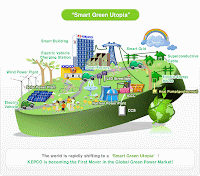The World Economic Forum, which every year selects Technology Pioneers has selected three smart Grid companies in their coveted list of the 2011 group. This is the first time since WEF launched their tech pioneer programs 11 years ago, clean tech companies match in numbers with IT companies. On-Ramp wireless, O-Power, and Tendril are the three Smart Grid Companies among the top 31 global Technology pioneers, which are set to lead the technology domain they operate in.
On-Ramp Wireless: It is provider for low-power wide area scalable sensor networking and location tracking systems. Its Ultral-Link Processing (ULP) systems enables to monitor billions of distributed end-point devices to measure and control scare resources like energy and water. It's primary application is in Smart Grid, water distribution systems, environmental resource monitoring, Oil & Gas, location tracking, and medical. The major advantage of the ULP systems is that it can receive even the weakest signal. With only 30 access points and at $1 million cost it can cover area as large as 10,000 square kilometer, which according to study can reach 97% of the Utility access points like meters, fault-indicaters, and sensors. With such a low-cost breakthrough technology,On-Ramp is set to become Qualcomm of Smart Grid industry.
O-Power: OPower has developed a software platform that allows utilities to connect with their customers in a effective targeted way through which the customers will be motivated to reduce energy use, and thus increase their participation and satisfaction in the program. The OPower 3.0 platform is based on their patent pending data analytics algorithm and cutting-edge behavioral science approach. Instead of just showing hourly, daily, monthly, or yearly energy usage, it shows which component is using more energy compare to the neighborhood, neighbors, or locality and will provide actionable suggestions targeted to specific customers. As high as 85% of the people who are exposed to the platform take action. According to company, if the platform is implement across the country, it can save customers $5 billion in their energy bills, reduce CO2 by 31 millions tons, and save energy to power 3 million homes each year. Opower is working with more than 36 utilities including 6 of the 10 largest utilities in the USA and is expanding in Canada and other countries.
Tendril: The company has developed suite of Smart grid products, which includes monitoring, device, network, and control. Its products helps both utilities and consumer manage energy consumption by allowing utility to communicate efficiently and effectively with customers, access real-time information and analytics, and through consumer awareness programs. The open, secure, scalable, and standard-based platform allows utilities to seamlessly integrate existing back office applications and network infrastructure thus saving money and resources. Application like Energy Awareness, Load Control, Demand Response, Electric Vehicle, and Distributed Generation allows utility to optimize energy usage and mitigagte peak load in real-time. Customers can manage energy usage through products like smart thermostats, in-home display, and smart outlets that allows to track energy cost and consumption by appliances, electronic, or other house-hold device. It products portfolio includes
1) Display : Vision, Insight, Tracker, Vantage
2) Control : LCS, Set Point, Volt,
3) Network : Transport, Relay, Translate
4) Monitoring : Set Point, Volt,
Tendril has partnership with smart meters and energy management technology providers like SilverSpring and Current Group allowing it to play a greater role in Smart Grid transformation. It has also secured more than 20 pilot project with 14 US utilities covering 35 million households, and is expanding internationally.




